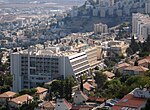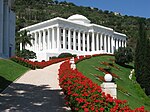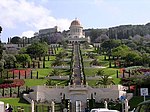The Universal House of Justice (Persian: بیتالعدل اعظم) is the nine-member supreme ruling body of the Baháʼí Faith. It was envisioned by Baháʼu'lláh, the founder of the Baháʼí Faith, as an institution that could legislate on issues not already addressed in the Baháʼí writings, providing flexibility for the Baháʼí Faith to adapt to changing conditions. It was first elected in 1963, and subsequently every five years, by delegates consisting of the members of Baháʼí National Spiritual Assemblies throughout the world.
The Universal House of Justice, as the head of the religion, has provided direction to the worldwide Baháʼí community primarily through a series of multi-year plans, as well as through annual messages delivered during the Ridván festival. The messages have focused on increasing the number of Local Spiritual Assemblies, translating Baháʼí literature, establishing Baháʼí Centres, completing Baháʼí Houses of Worship, holding international conferences, and developing educational systems to enhance literacy, the role of women, spirituality for children and youth, family life, social and economic development, and communal worship. The Universal House of Justice has also played a role in responding to systemic persecution of Baháʼís in Iran by garnering worldwide media attention.
The books and documents published by the Universal House of Justice are considered authoritative and its legislative decisions are considered infallible by Baháʼís. Although it is empowered to legislate on matters that are not addressed in the Baha'i holy writings, the Universal House of Justice has rarely exercised this function.
The Seat of the Universal House of Justice and its members reside in Haifa, Israel, on the slope of Mount Carmel. The most recent election was 29 April 2018. Although all other elected and appointed roles in the Baháʼí Faith are open to men and women, membership on the Universal House of Justice is male-only; the Baháʼí writings indicate that the reason for this will become clear in the future.











